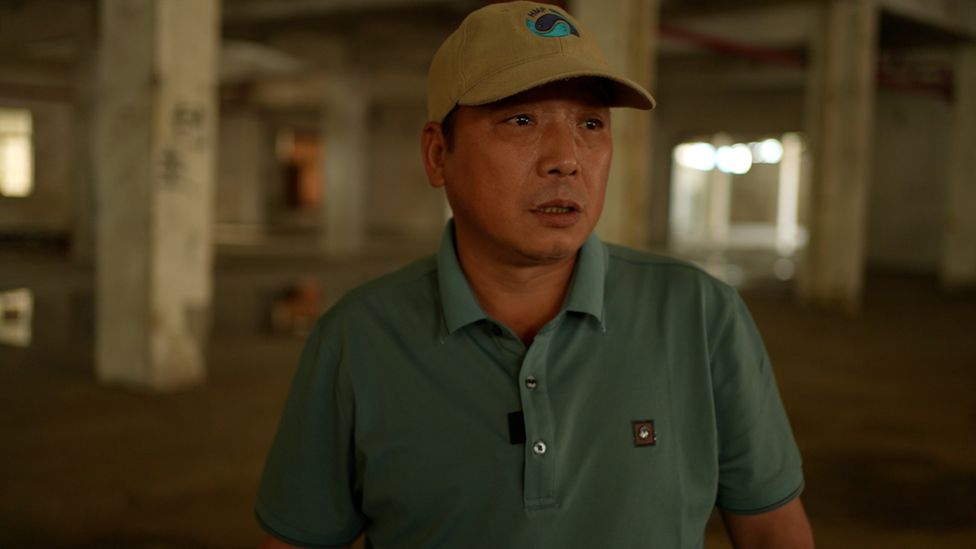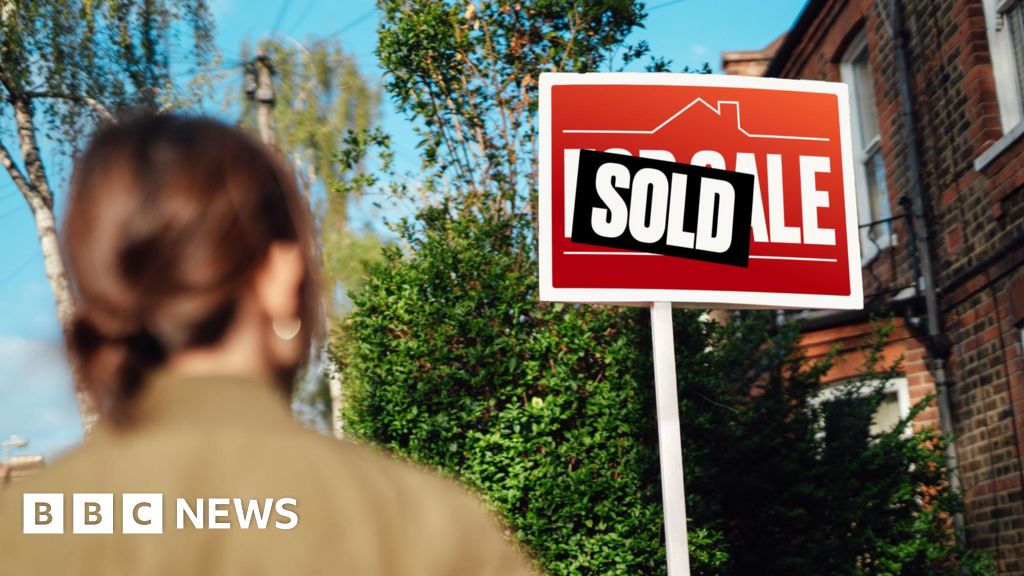ARTICLE AD BOX
 Image source, Wang Xiqing/BBC
Image source, Wang Xiqing/BBC
Ren Wenbing says he's owed thousands of dollars in redundancy pay after his ex-employer moved production out of China
By Laura Bicker
China Correspondent, BBC News
Ren Wenbing is reluctant to leave the hollowed-out brick shell which was once a thriving factory in China's manufacturing hub of Dongguan.
"All the workers feel astonished," says the 54-year-old as he points out where he once assembled furniture and where everyone would gather to eat lunch.
The owner of the company has moved production to South East Asia to cut costs. Mr Ren says he is owed more than 80,000 RMB ($11,000; £8,800) in redundancy pay, which could take him years to earn.
"We are disappointed, and we grieve," he adds, as a digger takes a sledgehammer to the windows.
Mr Ren is not just mourning the loss of a furniture firm. He grieves for the passing of China's once unstoppable economy, which is making it harder for millions of workers to find a job.
For people like him, not enough is now made in China.
But the West has been accusing China of making far too much - it was the dominant message during US Treasury Secretary Janet Yellen's recent visit. She chided Beijing for "unfair economic practices," for producing more than it needs or the world could afford to absorb.
Image source, Wang Xiqing/BBC
Image caption,Rubble fills the floor of this once-thriving furniture-making factory in Dongguan
The "Made in China" brand that is etched, sewn or branded on t-shirts, tables and TVs in so many homes around the world is changing. It is now at the heart of the electric cars that are pouring into Germany, and the solar panels that are powering Europe's renewable policies. And that is worrying the West.
Rising trade tensions with the United States, strict Covid lockdowns and a global downturn mean some manufacturers who once flocked to Chinese shores are looking elsewhere. Foreign investment in the country is at a 30-year low.
But now the old industrial pillars of furniture, clothing and electrical goods are struggling, Beijing is looking to its "new productive forces": solar panels, lithium batteries and electric cars.
"We are exporting to the UK, Belgium, Germany, mostly European countries, but also to Africa, Australia, South America, North America and also South East Asia," salesperson Yan Mu says as he shows off the company's storage batteries.
His is one of the stalls at an exhibition held by hundreds of green energy storage companies in a refurbished and repurposed steel plant on the edge of Beijing.
Image source, Wang Xiqing/BBC
Image caption,China is increasingly turning to clean energy products such as solar panels, lithium batteries and electric cars
"I think Chinese companies are leading the whole energy storage market. With innovation, with new technologies, battery sales, PCS [power conversion systems]... well, everything. Right now, I think 80% to 90% of the energy storage equipment are designed and manufactured in China."
A few hours' drive from Dongguan, there are more signs of the scale of this industry: there are solar panels as far as the eye can see.
China has installed more solar panels in the last year than the United States has managed to build in a decade, the mass manufacturing going on here driving the cost down to half of what it was last year.
Manufacturers across Europe are struggling to compete. In 2023, 97% of the solar panels installed across Europe came from China.
Image source, Wang Xiqing/BBC
Image caption,Solar panels dominate the landscape in this part of China - and Chinese-made panels make up 97% of those installed across Europe
But China's new industries are far less labour-intensive than the ones that once fuelled its spectacular growth - and they require specialised, high-skilled workers and, increasingly, robots. While China's youth unemployment has made the bigger headlines, its overall urban unemployment rate is still over 5%.
The US and the European Union believe this is how China is trying to save its economy - producing cut-price and state-subsidised green technology to sell abroad. They say it's a tactic that is driving down the cost of solar panels and other emerging technology and driving Western firms out of business.
China says its success is down to innovation, not state subsidies and there is a demand for their exports as countries transition from fossil fuels to more climate-friendly sources of energy.
Out with the old
But Mr Ren can't find a job in China's new success story.
He left his family farm in Henan as a teenager and moved to Dongguan, a city in the southern coastal Guangdong province with so many manufacturers it has become known as the "factory of the world". On one occasion, he didn't return home for 11 years.
He is one of nearly 300 million migrant workers who've moved from villages across China to major cities in search of work. Most leave their families behind: Mr Ren's children are being raised by their grandparents while he and his wife live in Dongguan, where three-quarters of the city's eight million residents are thought to be migrants.
"My children of course miss me," he says, adding he and his wife "had no choice".
Image source, Wang Xiqing/BBC
Image caption,Ren Wenbing says he had "no choice" but to leave his children with grandparents so he could earn a living in Dongguan
"We didn't earn much. After the daily costs of living, the money we sent home for our parents, the money for our children's education... we didn't have much left."
"All the migrant workers face this," he continues. "If we want to provide for our elderly and our children, we have to live away from our loved ones and work in other provinces. This is the reality."
Now, as China's future sits at a crossroads, so too do their lives.
Ren and his wife now live in a room that can fit only one bed and a side table. That is where he sits as he scrolls through his phone looking for job advertisements. Most factories are offering less than the 18RMB ($2.50; £2) per hour minimum wage. One advert offered only 13RMB an hour.
He needs his redundancy money and has gone to court to get it. But the owner appears to have left the country, leaving him and some 300 former colleagues in limbo.
"We witnessed the changes in Dongguan and have strong feelings for this land. This is our second home. We'd feel very sad and lost if we need to leave here. We won't forget what the local government did trying to give us more benefits. It's because of the government policies which gave us jobs and we were able to earn a living."
From around the mid-1980s, just after China opened to the world, Dongguan became the country's leading export and manufacturing base. It churned out cheap clothes, toys and shoes.
Back then, tens of thousands of workers would have queued at the gates to start their shift making shoes to export to the United States.
Image source, Wang Xiqing/BBC
Image caption,Rows of abandoned buildings - formerly clothes and shoe factories - stand empty in this quarter of Dongguan
But in more recent years, workers began to demand higher wages, while companies began cutting prices in order to win contracts, squeezing profits further. Then Donald Trump arrived in the White House, slapping tariffs on Chinese products - including shoes. Firms - searching for cheaper running costs and protection from the US-China trade wars - began to look elsewhere.
Now in one almost abandoned quarter of Dongguan, there are miles of empty low-rise buildings which look like ghost factories. The only inhabitant is a solitary security guard waving away any curious onlookers.
The constant hum of sewing machines has been replaced by a chorus of birdsong and the stubborn roots of banyan trees have worked their way under the concrete skeletons of buildings. The warm and often humid southern climate is helping nature take over what man has left behind.
In with the new
Dongguan is not giving up though: it is trying to transform itself as a high-tech hub to try to restore some of its former glory. On the edge of Songshan Lake, the technology giant Huawei has been building a campus to house 25,000 employees. There's a new science park and a string of hotels.
Alan Lee is sleeping in his freshly-painted office as he tries to capitalise on the city's new direction. The 32-year-old - having survived the economic downturn to start his business - has set his sights on exporting high-tech machinery to Europe.
Image source, Wang Xiqing/BBC
Image caption,Dongguan is trying to transform itself into a high-tech hub, including the construction of a Huawei campus for 25,000 employees
"Lots of people lost their jobs in recent years. People went into debt and were forced to sell their properties. We see that many companies suffer declining demands in exports. The managers face a lot of financial pressure and even have to close their factories. We chose to focus on trade so we don't have pressure on production."
But these jobs require knowledge of the new tech skills which people like Mr Ren have yet to acquire. His hopes of receiving the money he is owed are fading.
He thinks about what he will tell his children about why their father stayed away.
"I don't know how to give a good answer. I could simply say - your mother and I are away because we want to give a better life and better education. We hope you can learn things so that in future you don't need to work as hard as us."

 9 months ago
89
9 months ago
89








 English (US) ·
English (US) ·